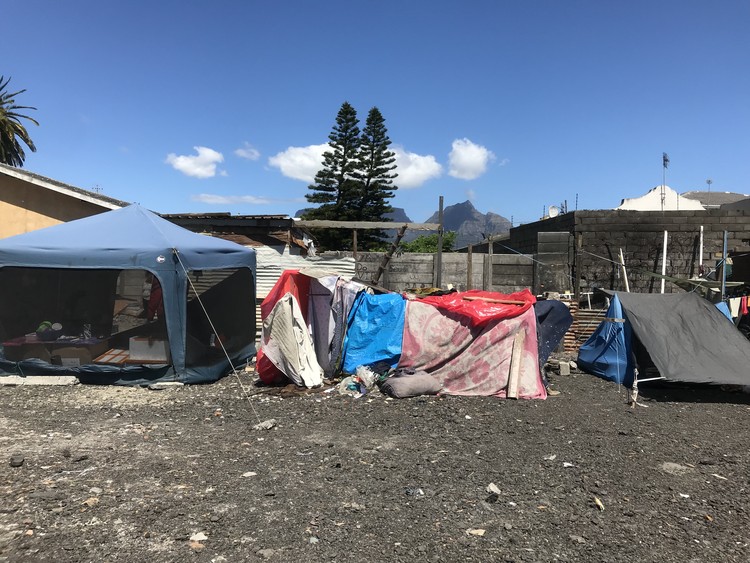Athlone fire victims sleep outside months later
Residents contest list of names given to the City’s Disaster Risk Management Centre
Some families, including young children, have been sleeping in these makeshift structures and tents after their shacks burnt down at Vygieskraal informal settlement in Athlone on 22 October Photos: Tariro Washinyira
- Confusion over a list of names given to the City of Cape Town’s Disaster Risk Management Centre has left about 43 adults and 18 children without a roof over their heads.
- Their shacks burnt down in a fire at Vygieskraal informal settlement in Athlone on 22 October. They can’t afford to rebuild on their own.
- The fire victims are currently living in makeshift shelters and tents.
About 43 adults and 18 children have been sleeping outside in makeshift structures at Vygieskraal informal settlement in Athlone. The families say they can’t afford to rebuild their shacks that were destroyed by a fire on 22 October.
“I’m barely getting by. I had to take my children to my mother in Bridgetown after many weeks of sleeping outside. One child is paralysed and uses a wheelchair. I have lost hope that we will ever get help,” says 37-year-old Melanie Prince.
Prince, a single mother of three children, says that officials from the City of Cape Town’s Disaster Risk Management Centre visited the settlement a day after their home and belongings were burnt.
She claims that people whose shacks did not burn down were wrongfully included in the City’s list. This list is very important because those named there are assisted with getting IDs. They can then apply to the South African Social Security Agency (SASSA) which pays victims about R1,300 to buy building material.
“While we were gathering the affected people, people from other sections of the informal settlement came and started shouting out their names and screaming. It was chaotic … They have refused to accept our list.”
Prince says that most of the fire victims have not been able to apply for the monetary humanitarian relief offered by SASSA as it requires them to apply using their identity documents which were burnt in the fire.
When GroundUp visited Vygieskraal last week, residents were queuing for soup donated by Elite Food Town Supermarket. In the section where the fire happened, a few camping tents and makeshift shelters with mattresses were seen.
Community leader Gamza Colby says a few churches and non-profit organisations donated clothes and food. A local construction company even delivered river sand to help raise and level the ground to avoid future flooding.
Sabrie Albertyn has been trying to rebuild his family’s home since October. But because he lost his ID along with other belongings in the fire, he can’t apply to SASSA for assistance.
Sabrie Albertyn says: “There was no time to save anything from the fire. I have four children. I live with my wife and two other people. A lot of us here don’t work. We stand at robots and hope to get piece work. Until when do we have to sleep outside with our children?”
Albertyn says his name was also not included in the City’s list of fire victims. “They took down the wrong names and are refusing to rectify the list. I lost my ID in the fire and so did other shack owners whose shacks were destroyed. They [the City] should not have collected names when things were upside down like that,” he says.
In response to GroundUp’s questions about the contested list of fire victims, Disaster Risk Management Centre spokesperson, Charlotte Powell, said that the list had been compiled and verified by officials and community leaders.
“In the immediate aftermath of the fire, the Disaster Risk Management Centre alerted SASSA as the primary agency responsible for providing humanitarian relief.”
SASSA Western Cape spokesperson Shivani Wahab said the agency can only assist people named on the victim list given by the City.
Support independent journalism
Donate using Payfast

Don't miss out on the latest news
We respect your privacy, and promise we won't spam you.
Next: “Bizarre” case reveals that magistrates lack training
Previous: Nearly R2 billion for apartheid reparations is unspent
© 2022 GroundUp. This article is licensed under a Creative Commons Attribution-NoDerivatives 4.0 International License.
You may republish this article, so long as you credit the authors and GroundUp, and do not change the text. Please include a link back to the original article.
We put an invisible pixel in the article so that we can count traffic to republishers. All analytics tools are solely on our servers. We do not give our logs to any third party. Logs are deleted after two weeks. We do not use any IP address identifying information except to count regional traffic. We are solely interested in counting hits, not tracking users. If you republish, please do not delete the invisible pixel.


